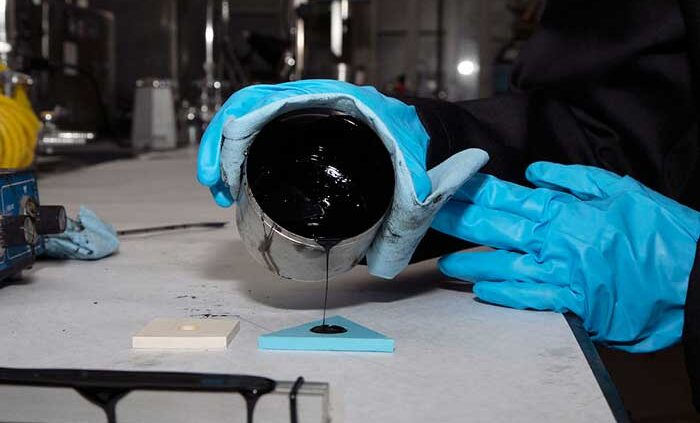Asphalt Binder
An overview on Asphalt Binder
asphalt binder also called asphalt cement binder, is a binder to keep the aggregates together like paste in asphalt mixes. In each asphalt cement there are several ingredients including sands and gravels which are applied in several layers. Asphalt Binder keeps these layers intact individually and also binds the layers together.
What are asphalt binders made of
Asphalt Binders are mostly made of Petroleum residue derivatives, commonly called Bitumen. Asphalt is a viscous black semi-liquid material which is originally from Crude Oil, either by refining and distillation or by availability on Natural Asphalt deposits. The general structure of the binder must include a reasonable amount of Bituminous content while having a proper density and softening point to act properly in the Hot Mix Asphalt. Commonly, penetration bitumen is one of the most famous asphalt binders while natural products including TLA (Trinidad Lake Asphalt) and Gilsonite have been used successfully for the same application, in case applied correctly. For example, in South China, by using a unique technic, Gilsonite with no more than 70% bitumen content is used as asphalt binder considering the special characteristics of Natural Bitumen which provides an enhanced reaction with the aggregates comparing normal binder products.
What would you like to know about asphalt? Don’t miss the “What is Asphalt” article
Which property is most important for asphalt binder
At the basic stage, the design of the Asphalt Cement aggregates and the performance required by usage must be considered to achieve an optimum on economics and performance of the Asphalt Binder. For example, different aggregate types, could result in different performance by a same binder while the percentage of consumption could vary based on the expected lifecycle of the final pavement.
To categorize generally, among the specifications of asphalt binder, softening point, melting point, brittle point and general reactions to temperature are most important comparing to other aspects such as viscosity. At different temperature the binder will release different amount of bituminous matter for binding with aggregates and as outside temperature vary, it could break or strengthen the bonding. The nature of the binder defines how these temperature fluctuations will affect the asphalt pavement.
|
Lowest Pavement Outside Temperature |
Highest Pavement Outside Temperature | Suggested Asphalt Binder |
|
-16 |
70 |
Normal Bitumen |
|
76 |
High Quality Bitumen |
|
|
-22 |
64 |
Normal Bitumen |
|
70 |
High Quality Bitumen | |
|
76 |
Modifier Required |
|
|
-28 |
52 |
Normal Bitumen |
|
64 |
High Quality Bitumen | |
|
76 |
Modifier Required |
|
|
-34 |
58 |
High Quality Bitumen |
|
76 |
Modifier Required |
|
| -40 | 76 |
Modifier Required |
Typical Cost
As per shown in above table, numerous binders can be used as asphalt binder. Some common binders’ general prices are advised as below:
- Bitumen 60/70 & Bitumen 80/100 – Normal Binder: 250 USD/MT FOB Persian Gulf
- Trinidad Lake Asphalt – Low Quality Binder: 450 USD/MT DDP North China
- American Gilsonite HMA Grade – High Quality Modifier: 1,200 USD/MT DDP European Union
- Zista Gilsonite Asphalt Binder Grade – High Quality Modifier: 650 USD/MT FOB Persian Gulf
What is binder course in asphalt
Asphalt cement consists of several layers of Aggregates, including Binder Course where Asphalt Binder is mostly applied. Binder Course stands the shear forces below the asphalt surface and decreases rutting affects by providing sufficient stone-on-stone contact.
Are tar and asphalt the same thing
NO, asphalt and tar are NOT the same material nevertheless commonly mistaken together. Asphalt is made of Petroleum originated materials including bitumen, while Tar is a by-product of coal distillation with different application than petroleum asphalt. The mistake has caused by using Tar as a binder in Pavements in the older times when coal was the main source of energy. By emerging Crude Oil into the industries and countries, Asphalt has fully replaced Tar in road paving applications. Another common mistake with Asphalt is Pitch which refers to certain natural bitumen deposits with lower softening point and low quality of bitumen contents such as Pitch Lakes.






Leave a Reply
Want to join the discussion?Feel free to contribute!